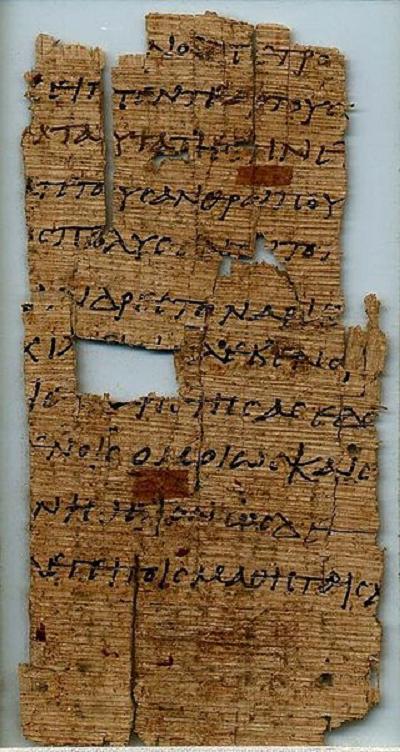| Change to Book/Chapter View |
|
|
|
Translation process is ongoing. For current status see details |
|
|

Papyrus 28 Discovered: Oxyrhynchus, Egypt Location: Berkeley, California; Pacific School of Religion, Palestine Institute Museum Contents: John 6:8-12, 17-22
John 6 8 One of his disciples, Andrew, Simon Peter’s brother, said to him, 9 “There is a boy here who has five barley loaves and two fish, but what are these among so many?” 10 Jesus
said, “Have the people sit down.” Now there was much
grass in that place.
So the men sat down, in number
about five thousand. 11 Jesus
therefore[1] took the loaves; and having given thanks, he
distributed to [..] 17 They
entered into the boat, and were going over
the sea to Capernaum. It was now dark,
and Jesus had not come 22 On the next day, the multitude that stood on the other side of the sea saw that there was no other boat there, except the one in which his disciples had embarked, and that Jesus hadn’t entered with his disciples into the boat, but his disciples had gone away alone.
|
How to read these pages: • The
translation to the left is based on the World English Bible. Words in regular
black font are words in the manuscript matching the Majority Text for that
passage. • Words
in italics cannot be seen in the manuscript, since the manuscript is
fragmentary. These words are supplied for readability by the World English
Bible translation. • Words
present in the manuscript but with some letters unreadable or missing are in blue
like this: blue. One Greek word often is
translated into multiple English words, and when this occurs, all the English
words are in blue. • Words
present in the manuscript but with spelling or trivial word order differences that do not affect the
meaning are in green like this: green. • If
the manuscript is different from the Majority Text, words in the Majority
Text that are missing from the text of the manuscript are marked through in red
like this: • If the manuscript is different from the Majority Text, words in the manuscript that are not in the Majority Text are underlined in red like this: new words.If the manuscript differs from the Majority Text yet matches another well-known text, this is noted in the footnotes.
|
